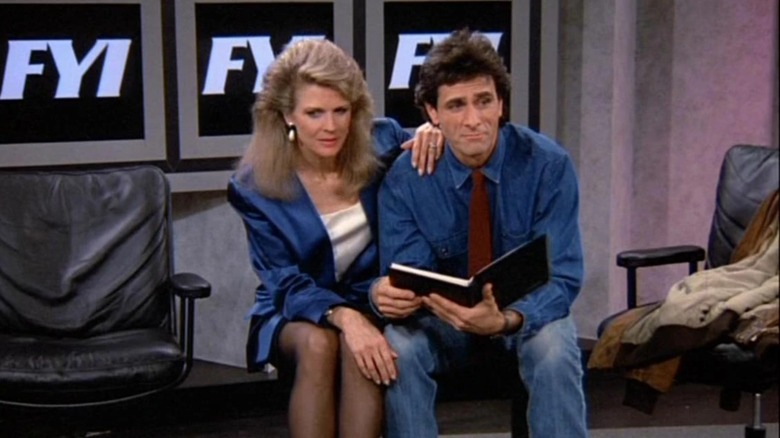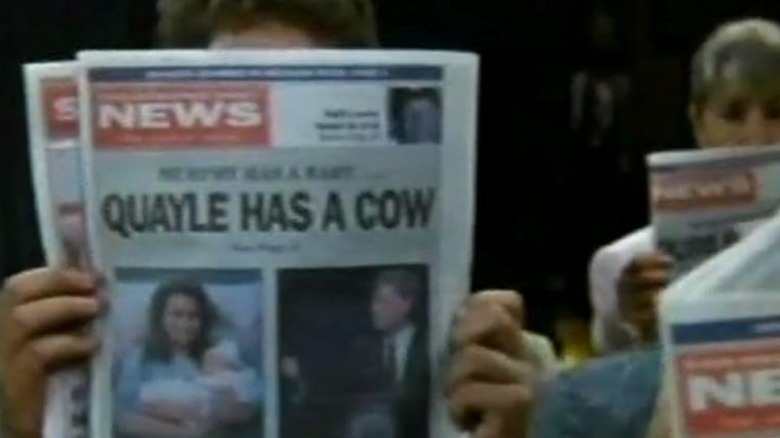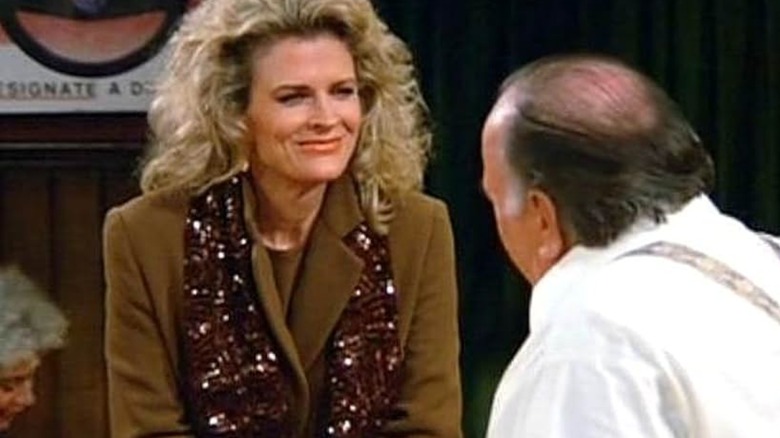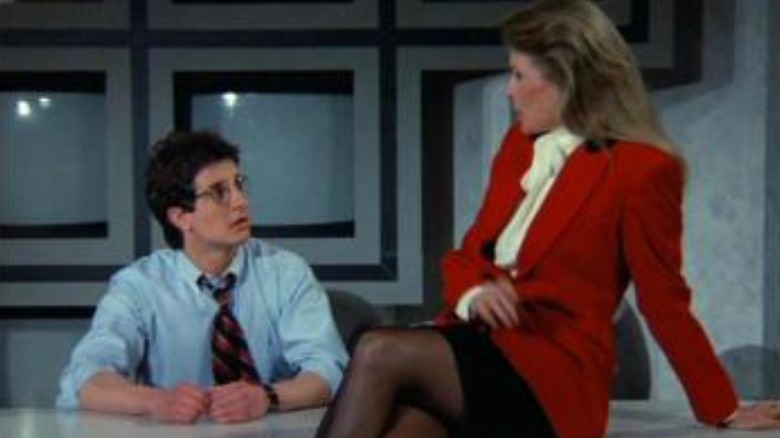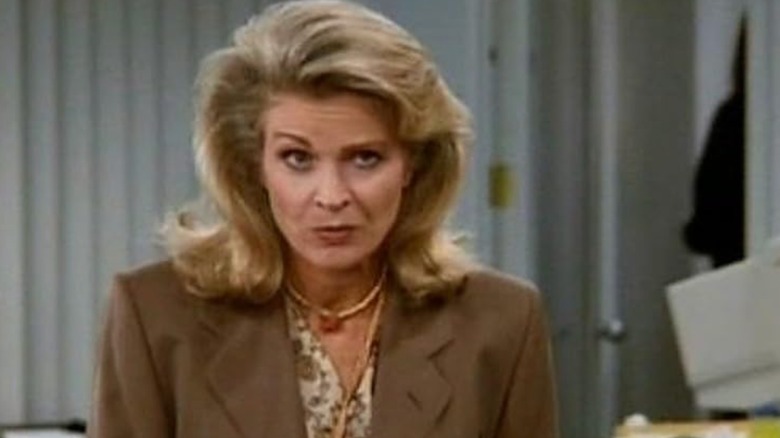One Classic '90s Sitcom Beefed With The Vice President
Forget the culture wars of today for a second. In the early '90s, one of the biggest political stories of the era was about a perceived pop culture war –- one that involved America's then vice-president and a fictional TV character. George H.W. Bush's vice president Dan Quayle seemed to almost single-handedly keep the media cycle in business thanks to a number of high profile verbal gaffes, which only seemed to escalate ahead of the 1992 presidential election. He famously spelled potato wrong during a children's spelling bee appearance on the campaign trail (a gag that turned up in an episode of "The Simpsons"), and earlier in the administration had misattributed the Holocaust to America, But none of his statements put him on the spot quite like the time he messed with "Murphy Brown."
"Murphy Brown" may not have a pop culture stronghold these days –- the wildly popular show never received a complete DVD release and isn't currently streaming — but in the '90s, it was can't-miss television. The CBS sitcom starred Candice Bergen as a bold and uncompromising career woman who relished the opportunity to tell stories that matter as an investigative journalist on a fictional TV show ("FYI"). In the show's first few seasons, Murphy was emblematic of the feminism of the time, for better and worse; most of her success came from her ability to navigate the world with the type of power and confidence usually reserved for men. Then, in the season 4 premiere, Murphy got pregnant.
Dan Quayle name dropped Murphy Brown for the weirdest reason
After mulling over her choices, the character decided to have her baby alone. It was a decision that would kick off a truly bizarre reaction from the press and especially the American political right. As journalist Karina Longworth notes in an in-depth episode of her podcast "Erotic '90s," ratings for the TV show remained steady after the pregnancy announcement, yet reporters spoke to Bergen and series creator Diane English as if Murphy's pregnancy could be the kiss of death for fictional Murphy and the show itself. It wasn't: the press only led to more eyes on the season finale, which saw Murphy give birth to a baby boy after going into labor live on the air.
Someone in Dan Quayle's camp was clearly among the viewers tuning in, as the vice president commented negatively on the character's decision in a speech the day after the season 4 finale aired. "It doesn't help matters when prime-time TV has Murphy Brown — a character who supposedly epitomizes today's intelligent, highly paid, professional woman — mocking the importance of fathers by bearing a child alone and calling it just another 'lifestyle choice,'" Quayle told a crowd assembled at the Commonwealth Club of California, somehow shoehorning the fictional character's motherhood into a section of his speech that, up to that point, had been about the L.A. Riots and the welfare system (per The Washington Post). As a 2019 episode of the You're Wrong About podcast points out, Quayle's speech was perceived as an attempt to regain some narrative control after Bush had given statements urging citizens to respect the legal process that allowed the cops who beat Rodney King to walk free.
The Murphy Brown speech took over the news cycle
Quayle later said that he hadn't seen "Murphy Brown" at the time, according to Vox. Yet his administration used the show to create a major talking point, attempting to reframe single motherhood as a wedge issue. "Marriage is probably the best anti-poverty program of all," Quayle asserted in the initial speech, which blew up in a proto-viral moment that caused a ripple effect across pop culture and politics throughout the summer. Quayle defended his comments the next day (saying "Hollywood thinks it's cute to glamorize illegitimacy"), while English released a statement noting that "If the vice president thinks it's disgraceful for an unmarried woman to bear a child, and if he believes a woman cannot adequately raise a child without a father, than he'd better make sure abortion remains safe and legal" (per Erotic '90s).
Everyone had an opinion. Robin Williams talked to Johnny Carson about the Murphy Brown speech. The president was asked about it again and again. Entertainment Weekly's Ken Tucker wrote an op-ed calling Quayle "a vice president who had turned into the rampaging id of his political party, expressing its darkest thoughts and drawing TV-camera heat." He concluded that "TV isn't an arm of social policy or government propaganda; it has no more responsibility to be upbeat and positive than do, say, poetry or the theater." The story was also front page news, with the New York City Daily News famously running the questionably paraphrased headline "QUAYLE TO MURPHY BROWN: YOU TRAMP!"
The sitcom had taken digs at Quayle before
As random as the reference may have seemed at the time, the politician already had some one-sided history with "Murphy Brown." The politically savvy show often spoke about current events, and as English admitted in a Lose Angeles Times piece in 2013, the show had been making the gaffe-happy politician the butt of the joke before the speech happened. "Quayle was a heartbeat away from the presidency, and so I decided to include a Dan Quayle joke in every episode of 'Murphy Brown,'" the showrunner explained. "Murphy Brown" had actually gotten the first laugh, and it got the last laugh, too.
When the sitcom returned in the fall, it was with an episode that called out Quayle personally, playing a portion of his speech on television (a choice that made sense in the show, as Murphy herself was somewhat famous) while harried, sleepless new mom Murphy watched from home. "Look at me, am I glamorous?" Murphy asked, referencing Quayle's follow-up statement while gesturing to pajamas she'd been wearing for days. The best quips came from Murphy herself right after the character found out she'd been caught in the political crossfire, but the show also made a sweet gesture by having its own fictional program, "FYI," respond with a spotlight on real single moms.
Millions of viewers tuned in for Murphy's response
The episode was massive. According to Vox, 70 million viewers were on the edge of their seats waiting for Murphy's response, a number that accounts for about 41% of all TV-watchers in the United States at the time. The cast and crew would cheekily thank Quayle when they cleaned up at the Emmys the following award season, and in one of the most memorable images encapsulating the fiasco, a TIME Magazine cover featured Bergen wearing a pin that reads "Murphy Brown For President."
In retrospect, the Dan Quayle-Murphy Brown controversy is a strange chapter of American history in which politics brushed up against fiction and television's consequences felt real. Quayle and Bush lost their re-election bid, with the scandal mentioned frequently in post-game breakdowns of the campaign. A 2018 "Murphy Brown" reboot was accompanied by coverage noting that, with a Trump presidency, the world might need Murphy more than ever. Of course, the show couldn't live up to those expectations: it was canceled after just one not-great season.
On screen, the show's greatest legacy may be the broad range of family dynamics that became more visible once it was clear that viewers weren't deterred by single moms on TV. Off screen, we can see ripples of Quayle's approach all across Trump-era politics (he was, after all, the TV president), especially when politicians evoke "family values" or blame pop culture for real-life social woes. Audiences growing up today may have never met the character Murphy Brown, but by having a child as a working single mom, her legacy lives on in ways no one could've expected.
